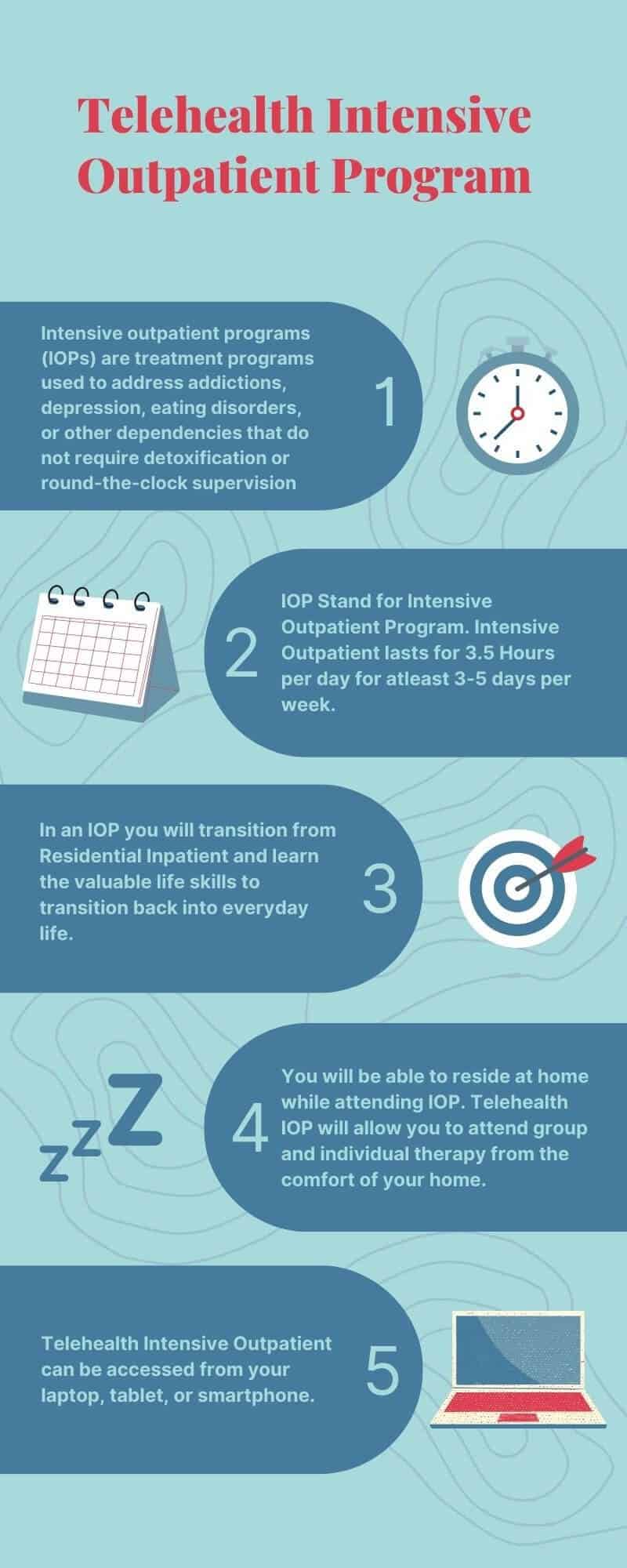Why an Intensive Outpatient Program (IOP) is Crucial for Enduring Recovery.
Why an Intensive Outpatient Program (IOP) is Crucial for Enduring Recovery.
Blog Article
Navigating the Complexities of Twin Medical Diagnosis Therapy Within an Extensive Outpatient Program Establishing
In the realm of psychological wellness and dependency treatment, the intersection of dual medical diagnosis offers a nuanced difficulty that demands a thorough and customized technique. By checking out the intricacies of double diagnosis treatment within this extensive outpatient context, a clearer path emerges towards holistic and lasting healing for those grappling with these intertwined difficulties.
Twin Medical Diagnosis Review

Comprehending dual diagnosis is essential as it calls for an extensive and integrated approach to treatment. By acknowledging the interaction between compound use and mental health, doctor can customize interventions to satisfy the unique demands of each person. This alternative technique not just addresses signs however additionally targets underlying factors that add to the dual medical diagnosis.
Additionally, neglected twin medical diagnosis can lead to a cycle of relapse and getting worse mental health and wellness symptoms. By recognizing the complexity of double diagnosis and providing customized treatment, healthcare experts can sustain individuals in accomplishing long-term healing and improved mental wellness.
Tailored Therapy Plans
Recognizing the elaborate interplay between compound usage conditions and psychological wellness problems, the growth of tailored treatment plans is paramount in attending to the complexities of dual diagnosis in psychological wellness treatment. Customized treatment plans are personalized methods that think about the one-of-a-kind needs, obstacles, and goals of individuals facing twin medical diagnosis. These strategies are developed collaboratively by a multidisciplinary team of specialists, consisting of psychiatrists, psycho therapists, social employees, and addiction experts, to make sure extensive and incorporated care.
Tailored treatment plans generally involve a combination of treatments, drugs, and behavior interventions that target both the substance usage disorder and the mental health condition concurrently. These plans may consist of cognitive-behavioral treatment, dialectical habits therapy, medication-assisted therapy, individual counseling, group therapy, and family treatment, to name a few evidence-based treatments. By tailoring treatment techniques to specific scenarios, customized strategies can resolve the origin of dual diagnosis, promote lasting healing, and improve general lifestyle for individuals struggling with co-occurring disorders.
Integrated Treatment Strategy
An integrated treatment approach in twin medical diagnosis therapy combines medical, emotional, and social interventions to resolve the complex demands of individuals with co-occurring compound usage disorders and psychological health conditions. This strategy recognizes that treating one aspect of a twin diagnosis without addressing the other can cause ineffective results. By incorporating medical interventions such as medicine administration for mental health problems with emotional therapies like cognitive-behavioral treatment for substance usage problems, people obtain extensive treatment that targets all facets of their twin medical diagnosis.
By incorporating social treatments like family members therapy, vocational assistance, and community resources, the therapy becomes a lot more alternative and tailored to the individual's details requirements - Intensive Outpatient Program (IOP). Generally, an incorporated treatment method in dual diagnosis therapy within an intensive outpatient program setting intends to provide thorough, effective, and individualized treatment to individuals facing co-occurring conditions.
Challenges in IOP Setting
In the context of twin medical diagnosis therapy within an extensive outpatient program, browsing the complexities of go to these guys co-occurring material use disorders and mental health and wellness conditions offers substantial obstacles. Among the main obstacles in the IOP setup is the control of treatment in between psychological health experts and chemical abuse professionals to make sure an extensive treatment strategy. This requires reliable communication, cooperation, and a deep understanding of how these problems engage and affect each other.

Furthermore, addressing stigma and resistance to therapy within the IOP setting can hinder development. Some individuals might be reluctant to reveal their twin medical diagnosis or may really feel ashamed, preventing their engagement in the healing procedure. Conquering these obstacles requires an encouraging and non-judgmental environment that cultivates trust and openness.

Collaborative Professional Initiatives
Reliable double medical diagnosis therapy in an intensive outpatient program demands smooth cooperation amongst psychological health specialists and drug abuse image source professionals to make certain a detailed and integrated method to care (Intensive Outpatient Program (IOP)). This cooperation is important to attend to the complicated interaction between psychological wellness disorders and compound abuse, as both facets require to be dealt with simultaneously for effective end results. Mental wellness professionals bring expertise in identifying and treating mental health conditions, while chemical abuse specialists have specialized understanding in addressing addiction issues. By interacting, these experts can produce customized therapy strategies that accommodate the unique requirements of each patient, considering both their psychological health and drug abuse obstacles.
Joint initiatives additionally extend to regular communication and details sharing amongst employee to guarantee a cohesive treatment strategy. This may include situation meetings, joint sessions with the patient, or shared documents to track progression and readjust treatment approaches as needed. In addition, cooperation might include entailing other medical care professionals such as health care physicians or family members specialists to offer holistic assistance to the person. Eventually, a joined front of professionals collaborating boosts the effectiveness of double diagnosis therapy within an intensive outpatient program.
Final Thought
In conclusion, reliable double medical diagnosis therapy within an intensive outpatient program setup requires tailored therapy plans and an integrated care strategy. Difficulties may develop in this setting, yet joint initiatives amongst specialists can assist browse these intricacies. By resolving the unique requirements of individuals with co-occurring mental health and material make use of disorders, IOP programs can offer comprehensive and alternative care to support recuperation navigate to these guys and total health.
Report this page